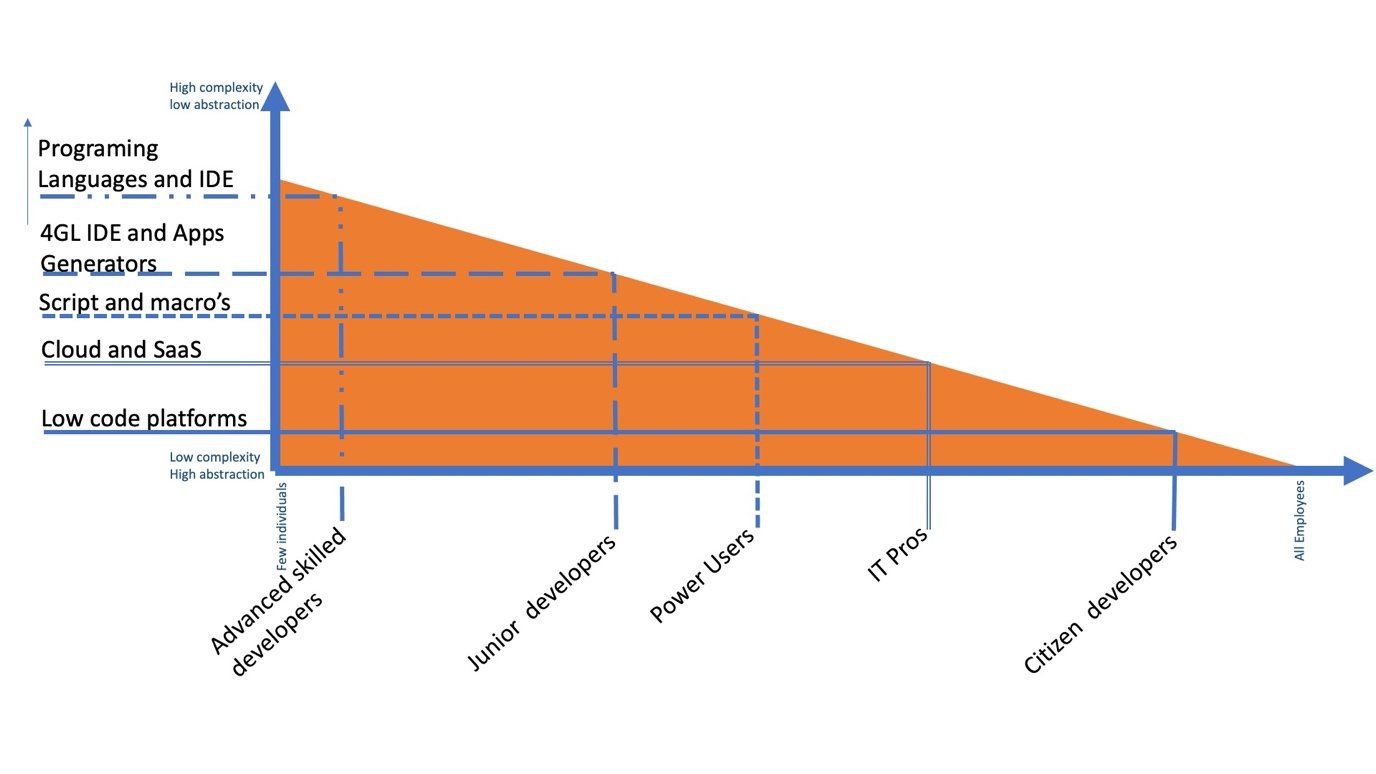Citizen Developers: The skillset they need, and the value they bring.
If you’re in the IT industry, you must have heard about the term citizen developer. Lately, I was interviewed about the key capabilities of our enterprise low-code platform AgilePoint, and was asked a few critical questions about citizen developers.
1. What is the exact definition of citizen developer and is this a new role?
2. What are the skillsets needed for citizen developers?
3. Is there a course for citizen developers?
4. What challenges Citizen developers have?
5. And eventually, what value does a citizen developer bring to a company?
First things first – the definition, citizen developer
The term is composed of 2 words: Citizen and Developer.
- Citizen – ANY legal member of the company/organization
- Developer - a person who CREATES computer software/application/digital solutions.
The combined term is: Any legal member of the company/organization who CREATES computer software/application/digital solutions, and the sum is bigger than its parts.
Put it another way, citizen developer - ANY employee who CREATE a software which is not a DEVELOPER by its role or position (note the ANY employee).
Police Support/Community
Think of a Citizen Developer like a volunteer police support/community – a civilian who volunteers to do or help with some routine and abstract police work. This is just one sample analogy out of many others (like volunteer medic and many more) – but Citizen Developer is no other in concept than those known volunteer roles, and once this has been said, it can help address and answer many of the question regarding Citizen Developers.
Is citizen developer a new role?
No. Citizen developers are not new, not at all.
The term, though, is somewhat new. With any company you could always find those real smart and tech savvy users who would play with Microsoft Excel/word, MS Access OR InfoPath and knew how to create super cool “business apps” using excel/access/… formula/tricks/macro’s.
At some point, mainly with enterprise, they were called “key users”, “power users”, “IT Trusty” and some more. Yet, in the recent years, few things have changed:
On one hand, we live in a digital world and we are now “home-made” tech savvies. We all use social network, managing our personal and professional digital space, create our smart home, using IFTT to create recipes to connect RING to our Gmail to send notification when the kids are back at home and more.
On the other hand, technology was greatly abstracted and simplified, including IT systems and technologies, using low-code platforms, cloud/shared services, app generators.
So, in the recent years, as the two aforementioned climate changes met, it came to a point that almost any user in a company can be a “power user” – and thus the term has evolved into Citizen Developer > almost any legal member/employee of the company can become a developer.

So, what is the skillset of a citizen developer?
Citizen developers do not have any specific skillset. The main skills for becoming a citizen developer are:
- Tech instincts and rational logic – as mentioned before, we’re living in a digital world, and as the tech-savvy generation is younger, this “skillset” is more in-demand.
- Passion and willing to contribute and change
Let’s refer back to the analogy of a volunteer police support and how they would correlate:
| Citizen Developer | Volunteer Police Support |
|---|---|
| Tech instincts and rational logic | Honesty, law believer |
| Passion and willing to change | Passion to help, serve and create a better community |
It is imperative that these two conditions are met; what would a volunteer police support be if he/she does not have any kind of affinity in serving and creating a better community? This is crucial to be understood as this is the biggest pitfall in citizen development, it all starts here.
Is that enough?
It can be for small, departmental success stories, like in the back days of office macros. But to make it a success story at company level and harness this climate change into company’s operational and business game changers, the organization will need to create a Citizen Developer climate, that is:
- Assign Citizen Developers: those employees who are eligible to be a Citizen Developer
- Get the right tools and services which can be abstracted and delegate into non-developers.
- The first move to achieve a goal, is to declare it. Create the initiative and support it with rules and resources.
- Create a training/on-boarding program – training should provide the specific training for the services and tools chosen, but more importantly, the practice and flow of creating new apps.
- Create support teams and rings – trained developers and IT professional should be assigned to support and review Citizen Developers initiatives and ongoing work.
- Govern – This is the most important part to harness these climate changes into a managed and objective company success (aka Change Management). If you’ll note closely all above items are to ensure better governance. Eventually, the idea is to delegate IT, App creation and digital transformation, NOT TO shadow it. The last thing any company would like is to find its LOB relaying on yet another Excel macro, or alike, no one knows how to change and keeping you back from upgrading office
| Citizen Developer | Volunteer Police Support |
|---|---|
| Get the right tools and services | Identify the law and police work that can be delegated |
| Declare it | Create a volunteer community |
| Create training program | Application form, academy basic training, on-job supervised hours, uniform badge, create credentials and provide required access |
| Create support teams and rings | Work is backed and accompanied with official policeman/woman. 1 policeman/woman on a team of up to x volunteers (depending on mission) |
| Govern | Work mandate by police department, clear rules and responsibilities, close sync. up with volunteers |
Where is the challenge?
There are two main challenges:
- Choosing the right tools to provide the correct level of abstraction and delegation.
- Governance. Out of the two this is the most comprehensive and significant challenge.
To mitigate these challenges:
- Choose the right tools > decide on your audience and choose the correct tools from audience perspective, skillset, and the company Citizen Developer climate. See image 1 above.
- Governance
- Governance should start before you start to delegate development to citizen.
- Starting is easier when governance is in place.
- Governing is easier when done right from the start.
- Make sure you choose the tools that provide built-in level of governance and control.
- Decide on areas of application type to allow more clarity for Citizen Developers.
- Create onboarding program
- Guide the constant change Citizen Developers are introducing in the organization
Is there an introductory citizen developer course?
Project Management Institute, or PMI has introduced a foundational course that is vendor-agnostic. It’s a good start to dip your toes in the Low-Code/No-Code Citizen Development world. However, it is advisable to develop your own on-boarding and training program for the tools and services you use.
PMI Citizen Developer Foundation Course
Summary – what value do citizen developers bring?
The growth of human civilization has resulted in a network of roads, transportation infrastructure, internet, communities and more. This growth has also expanded the legal turf of the nation state and more police work is needed to maintain public order. This is where volunteer police support communities were generated, and now a days, many police departments cannot meet their daily task without the support of police volunteer community.
Same is the case with the business and operational teams – as business climate becomes more and more dynamic, digital, and competitive, the traditional IT teams and tools are struggling to keep up with the pace and need the volunteer IT support, that is Citizen Developers.
Another way to look at it, as climate change, more charismatic users and LOB managers have the options to BOS (Buy Own Services), increasing on the risk of shadow IT. Better to leverage this climate, delegate them with tools that have proper governance capabilities and can speed them up on the digital path.
-------------------------------------------------
The article was contributed by Yaniv Levi, Technical Services Director at AgilePoint, EMEA. He can be reached out at his LinkedIn Profile.
Request a demo today! to see how AgilePoint helps you unlock automation at scale with citizen developer governance.
Are you ready to reengineer your business
automation processes?

A modern process automation and orchestration platform that enables you to open up and seize new business opportunities, supercharge innovation, unlock new levels of efficiency and productivity, and deliver the experiences that help you win.
Follow Us
Platform

Automate business processes and workflows at scale. AgilePoint helps enterprises democratize and accelerate digital transformation, reduce technical debt and future-proof ROI.
Resources
© 2023 AgilePoint. All rights reserved.



